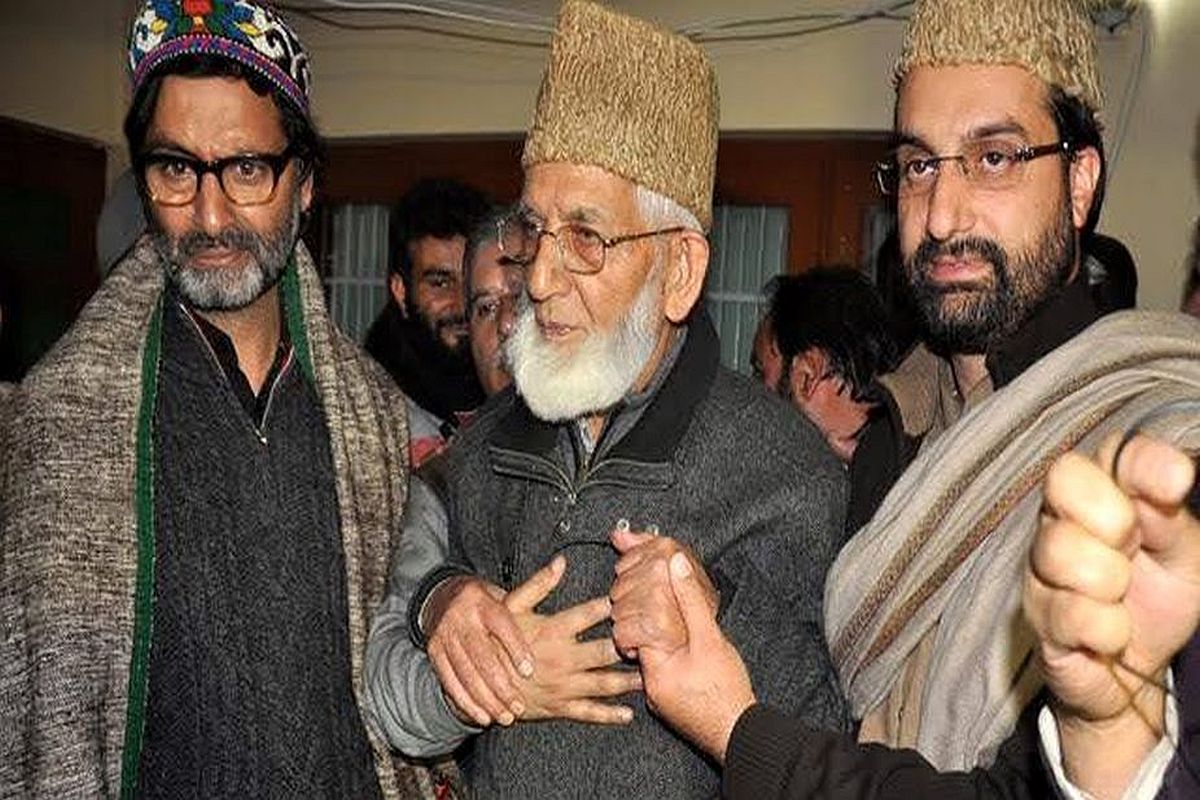J&K LG Sinha calls for unity against terrorism in Baramulla
The LG was interacting with the youth in the border district town of Baramulla in North Kashmir.
According to the intelligence inputs, the Jamaat-e-Islami (J-K) has been using its network of schools to spread anti-India feelings among children in the Kashmir Valley.

Syed Ali Shah Geelani (Centre) (File Photo: Facebook)
The Jamaat-e-Islami Jammu and Kashmir, which was banned by the government recently, has strong links with Pakistan’s spy agency Inter-Services Intelligence or ISI, and has been maintaining regular contact with the Pakistan High Commission in New Delhi for promoting secessionism in the state, officials have said.
The most significant member of the Jamaat-e-Islami (J&K) in the Separatist outfit Hurriyat Conference is Syed Ali Shah Geelani, who was at one point of time designated as the ‘Amir-e-Jihad’ (Head of Jehad) of Jammu and Kashmir by the proscribed terror organisation.
Jamaat-e-Islami (J&K) has established strong links with Pakistan’s ISI for ensuring logistics support for arming, training and supply of weapons to Kashmiri youths and its leaders continue to maintain regular contact with the Pakistan High Commission in New Delhi for support, a senior government official said.
Advertisement
According to the intelligence inputs, the Jamaat-e-Islami (J&K) has been using its network of schools to spread anti-India feelings among children in the Kashmir Valley and encouraging cadres of the Jamaat-e-Islami (J&K) youth wing (Jamiat-ul-Tulba) to join “Jihad” by getting recruited into terrorist outfits.
It is no surprise that the pattern of terrorist activity in the Valley has a strong correlation with the spread of the hardline Jamaat-e-Islami (J&K) activists in the area, the official said.
The Jamaat-e-Islami (J&K) has been utilising the fear generated by Pakistan-based terror group Hizb-ul-Mujahideen and leveraging the financial clouts of its members and trusts under its control to mobilise funds both locally and from abroad and using these assets to consolidate its hold at the grassroots level.
This base is used to provide a fertile ground for the operation of terrorist outfits in the Kashmir Valley including motivation, new recruits, shelters and hideouts, couriers etc.
The hardliner elements in Jamaat-e-Islami (J&K) have been at the forefront of secessionist activities and were the brain behind the formation of the All Party Hurriyat Conference (APHC) as well as terror outfit Hizb-ul-mujahideen, another official said.
The Jamaat-e-Islami (J&K) also has several trusts for running schools to disseminate orthodox Islamic education, has a youth wing and has numerous publications for spreading its fundamentalist ideology.
Behind this facade, hardliners within the Jamaat-e-Islami (J&K) have been involved with terror groups, have actively participated in the promotion of secessionist activities, have been questioning the finality of the Jammu and Kashmir’s accession to India and have been “striving for the merger of the state with Pakistan”, the official said.
The group has extensive foreign links through which it secures funding and promotes its objectives. It has close links with Jamaat-e-Islami (Pakistan), Jamaat-e-Islami (Pakistan-occupied Kashmir) and Jamaat-e-Islami (Bangladesh), where several terrorists have faced death penalty for anti-national activities.
It has also been promoting sectarian tensions in the Valley by mobilizing opinion against the Hanfi-Aithkadi sects.
Syed Ali Shah Gilani, the Jamaat-e-Islami (J&K) representative in the Hurriyat, has been continuously supporting terrorism in Kashmir and even supported Pakistan during the Kargil War.
The Jamaat-e-Islami (J&K) was formed in 1945 as a chapter of the Jamaat-e-Islami Hind and separated in 1953 due to differences over political ideology with the parent body.
It is opposed to participating in the electoral process and has been pursuing the agenda of setting up an independent theocratic Islamic State by destabilising the government established by law.
Jamaat-e-Islami (J&K) was banned twice in the past due to its activities. The first time in 1975 for two years by the Jammu and Kashmir government and the second time in April 1990 for three years by the Centre, when Mufti Mohammad Sayeed was the Union home minister. The ban continued till December 1993.
The Jamaat-e-Islami (J&K) was banned again by the central government on February 28.
Days after launching a crackdown on separatist group Jamaat-e-Islami, Jammu and Kashmir, the Ministry of Home Affairs (MHA) on Thursday banned it under the Unlawful Activities (Prevention) Act for alleged anti-national and subversive activities.
Orders have been issued to seize the assets of the socio-political-religious group.
A notification on the ban was issued by the Ministry of Home Affairs (MHA) after a high-level meeting on security, chaired by Prime Minister Narendra Modi.
The state government has, however, made it clear that orphanages and mosques run and owned by the group had been kept out of the seizure order.
In nocturnal raids conducted in the south, central and north Kashmir districts, Jammu Kashmir Liberation Front Chief Yasin Malik and several Jamaat-e-Islami leaders were also arrested in the raid, including its chief, (Ameer-e-Jamaat) Abdul Hamid Fayaz were arrested late on February 22.
Former Jammu and Kashmir Chief Minister Mehbooba Mufti had on Wednesday led a protest march against the arrest of Jamaat-e-Islami (JeI) members in the state.
Mufti led the march of her party leaders and workers in Anantnag town.
(With agency inputs)
Advertisement